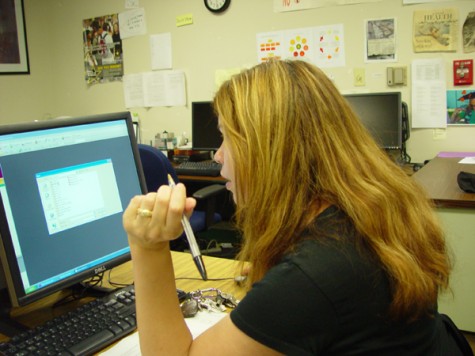Women’s minds work like “baskets,” while men’s work like “wells” were concepts discussed at the workshop Men and Women: Understanding the Opposite Sex, held by the health center on Oct. 30.
The workshop was conducted by Sindy Suess, a certified life coach specializing in women’s empowerment. It was offered to faculty and students as part of a campaign to “promote the idea of wellness on many levels,” said Crescent Orpelli, mental health counselor at GCC.
In the hour-long workshop, Suess explained the differences between men and women, focusing on two main topics: how each gender handles objectives, and how each communicates.
“The reason this is important is because we so often misinterpret each other…. Our ignorance about our differences creates more struggle in our relationships than needs to be there,” she said.
In handling objectives, men are “single focused.” This, Suess explained, means that they can only focus on one thing at a time and in order to begin a new task, they need “transition time.”
Women, on the other hand, have “diffused focus.” Their concentration can easily be redirected to a different objective. “It’s a wonderful design for a woman because you don’t want to have a single focus cooking and not hear the baby… but it also has challenges,” Suess said.
She backed this concept with anthropology. “Men were designed to be the hunters for the tribe, so a lot of their physiology and wiring is all about being good hunters, and women used to be the gatherers…their brains, their vision, are designed for that.”
To make her points, Suess illustrated these ideas sharing her own experiences and testimonials from her clients.
“I thought [the workshop] was really helpful,” said Anna Avedisian, 18, an undecided major. “She gave out really good examples, things that I didn’t realize until she actually said it.”
Mike Eberts, professor of mass communications, shared his insight on the talk. “For the last 20 years I have been a bicycle commuter…I didn’t know anything about this ‘transition’ until today, but just thinking about it, when I get home I can pretty much hit the ground running; and it might because I have that 20-30 minutes bike ride.”
The second half of the workshop was focused on communication. To give advice on how to listen to the opposite sex, Suess used the analogies of women’s minds being like “baskets” and men’s being like “wells.”
“As a woman is going about her day, because she has diffused awareness, things are constantly dropping into her “basket”…all this stuff is filling it up to the point where we get overloaded,” she said.
Her recommendation was to help women “outflow” by just listening to them regardless of how pointless and long the talk seems.
Suess’ advice on getting a man to share his thoughts was to wait 30 seconds for the man to “lower his bucket down the well.” She explained that, as they want to give the best answer to a question, and it takes them longer to answer.
She emphasized that practicing this way of listening can be difficult for both genders because it’s not the way we are designed, but making the effort will make a great difference.
John Quintanilla, 20, biology major, described the workshop as “quite insightful.” He was there with his girlfriend, Leslibet Perales, 19, child development major, who is sure that this will better their relationship.
For more information on health workshops and services offered in GCC, visit the health center located on the first floor of the San Rafael building.

